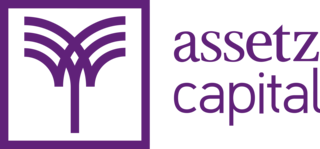Related Research Articles
The Federal National Mortgage Association (FNMA), commonly known as Fannie Mae, is a United States government-sponsored enterprise (GSE) and, since 1968, a publicly traded company. Founded in 1938 during the Great Depression as part of the New Deal, the corporation's purpose is to expand the secondary mortgage market by securitizing mortgage loans in the form of mortgage-backed securities (MBS), allowing lenders to reinvest their assets into more lending and in effect increasing the number of lenders in the mortgage market by reducing the reliance on locally based savings and loan associations. Its brother organization is the Federal Home Loan Mortgage Corporation (FHLMC), better known as Freddie Mac. In 2022, Fannie Mae was ranked number 33 on the Fortune 500 rankings of the largest United States corporations by total revenue.

Factoring is a financial transaction and a type of debtor finance in which a business sells its accounts receivable to a third party at a discount. A business will sometimes factor its receivable assets to meet its present and immediate cash needs. Forfaiting is a factoring arrangement used in international trade finance by exporters who wish to sell their receivables to a forfaiter. Factoring is commonly referred to as accounts receivable factoring, invoice factoring, and sometimes accounts receivable financing. Accounts receivable financing is a term more accurately used to describe a form of asset based lending against accounts receivable. The Commercial Finance Association is the leading trade association of the asset-based lending and factoring industries.

Peer-to-peer lending, also abbreviated as P2P lending, is the practice of lending money to individuals or businesses through online services that match lenders with borrowers. Peer-to-peer lending companies often offer their services online, and attempt to operate with lower overhead and provide their services more cheaply than traditional financial institutions. As a result, lenders can earn higher returns compared to savings and investment products offered by banks, while borrowers can borrow money at lower interest rates, even after the P2P lending company has taken a fee for providing the match-making platform and credit checking the borrower. There is the risk of the borrower defaulting on the loans taken out from peer-lending websites.

Vanquis Banking Group, formerly Provident Financial plc, is specialist bank for UK adults who are not served by mainstream lenders. Based in Bradford, England, it specialises in credit cards, online loans and consumer vehicle finance. It is listed on the London Stock Exchange and is a constituent of the FTSE 250 Index.
SME finance is the funding of small and medium-sized enterprises, and represents a major function of the general business finance market – in which capital for different types of firms are supplied, acquired, and costed or priced. Capital is supplied through the business finance market in the form of bank loans and overdrafts; leasing and hire-purchase arrangements; equity/corporate bond issues; venture capital or private equity; asset-based finance such as factoring and invoice discounting, and government funding in the form of grants or loans.
The Small Firms Loan Guarantee (SFLG) was a UK government loan support scheme for small businesses that ran from 1981 to January 2009.
In the period September 2007 to December 2009, during the events now widely known as the Global Financial Crisis, the UK government enacted a number of financial interventions in support of the UK banking sector and four UK banks in particular.
The Enterprise Finance Guarantee (EFG) is a UK government-guaranteed lending scheme intended to help smaller viable businesses who may be struggling to secure finance, by facilitating bank loans of between £1,000 and £1 million.

Funding Circle is a commercial lender. Originally it was a peer-to-peer lending marketplace that allowed the public to lend money directly to small and medium-sized businesses. Through this exchange businesses access lower costs of financing than they would get at a bank and the public are able to become lenders and in doing so make a return on their capital. It closed its lending option to "retail investors" between 2020 and 2022, and then announced, in March 2022, that it had made the closure permanent.

Kriya is a British business finance lender, specialising in invoice finance, business loans and embedded finance. Kriya was the first company to allow businesses to borrow against individual outstanding invoices.
Rebuildingsociety.com is a Leeds-based peer-to-peer lending platform, founded in 2012 by Daniel Rajkumar, to facilitate the online arranging of finance between lenders and small and medium-sized enterprises. The first loans were completed in February 2013.

Assetz Capital is a British company which makes property-secured loans to businesses. It was established in 2012 as a peer-to-peer or "marketplace" lender which allowed private and institutional investors to lend money directly to small businesses (SMEs) and property developers. In December 2022 it became solely funded by institutional capital for new lending.
Capital for Enterprise Limited (CfEL) was a limited company in the United Kingdom owned by the Department for Business, Innovation and Skills (BIS). CfEL was responsible for managing BIS's financial schemes, such as venture capital funds and loan guarantees, aimed at helping small and medium enterprises (SMEs). It invested over £1.8 billion from its formation and alongside private capital provided £6.5 billion in credit for SMEs. It ceased operating independently on 1 October 2013 and became part of the British Business Bank.

British Business Bank plc (BBB) is a state-owned economic development bank established by the UK Government. Its aim is to increase the supply of credit to small and medium enterprises (SMEs) as well as providing business advice services. It is structured as a public limited company and is owned by the Department for Business and Trade. The bank has its headquarters in Sheffield.
A business loan is a loan specifically intended for business purposes. As with all loans, it involves the creation of a debt, which will be repaid with added interest. There are a number of different types of business loans, including bank loans, mezzanine financing, asset-based financing, invoice financing, microloans, business cash advances and cash flow loans.

Between May 2006 and the end of 2012 there were sixty-seven finance company collapses in New Zealand; including companies entering into liquidation, receivership or moratoria. An inquiry by the New Zealand Parliament estimated losses at over $3 billion that affected between 150,000 and 200,000 depositors. The most high-profile collapses were South Canterbury Finance, Hanover Finance and Bridgecorp Holdings. The collapse radically reduced the size and importance of the non-bank finance sector in New Zealand. According to the Reserve Bank, at the height of financial expansion prior to the 2007 crisis, non-bank lenders had assets of about $25 billion and made up 8 percent of lending by financial institutions. By late 2013 the size of the finance sector was half its previous size and accounted for only 3 percent of institutional lending. In the years following the beginning of the collapses, sweeping legislative and regulatory changes were made, aimed at improving oversight and regulation of the finance industry.
Secure Trust Bank is a British retail and commercial banking group listed on the London Stock Exchange, where it is a constituent of the Main Market.
Capital Match is a invoice financing platform for small and medium enterprises (SMEs) in Southeast Asia. Headquartered in Singapore, it operates an online platform for SMEs to seek funds from investors.

Tide is a UK financial technology company providing mobile-first banking services for small and medium-sized enterprises. It enables businesses to set up a current account and get instant access to various financial services. Established in 2015, Tide is one of the first digital-only finance platforms in the UK to provide current accounts for businesses. As of 2020, it had offices in London (headquarters), Sofia (Bulgaria) and Hyderabad (India).

Greensill Capital was a financial services company based in the United Kingdom and Australia. It focused on the provision of supply chain financing and related services. The company was founded in 2011 by Lex Greensill. It filed for insolvency protection on 8 March 2021.
References
- ↑ "Skipton launches £25m loan lifeline to SMEs". Telegraph. 4 December 2007. Retrieved 3 December 2013.
- ↑ "Growing your business - GOV.UK". Businesslink.gov.uk. 8 November 2013. Retrieved 3 December 2013.
- ↑ Enterprise Finance Guarantee scheme to enable loans from Skipton Business Finance Archived October 9, 2012, at the Wayback Machine
- ↑ "Sharp rise in invoice finance boosts Skipton". Yorkshire Post. 2 July 2012. Retrieved 3 December 2013.
- ↑ "DERBYSHIRE: Firms to get financial support - Mansfield and Ashfield Chad". Chad.co.uk. 1 June 2013. Retrieved 3 December 2013.
- ↑ "DERBYSHIRE: Firms to get financial support". Matlock Mercury. 1 June 2013. Retrieved 3 December 2013.